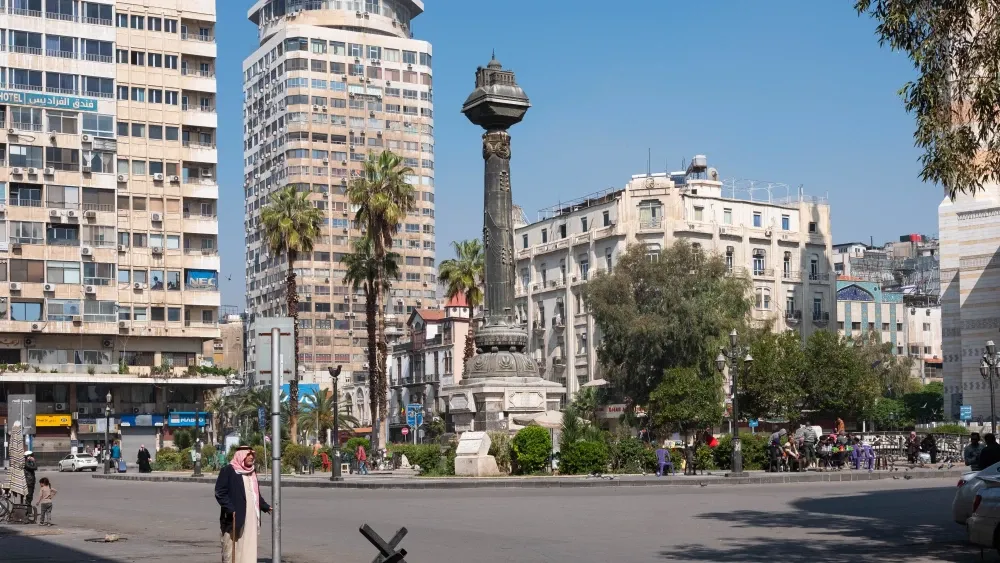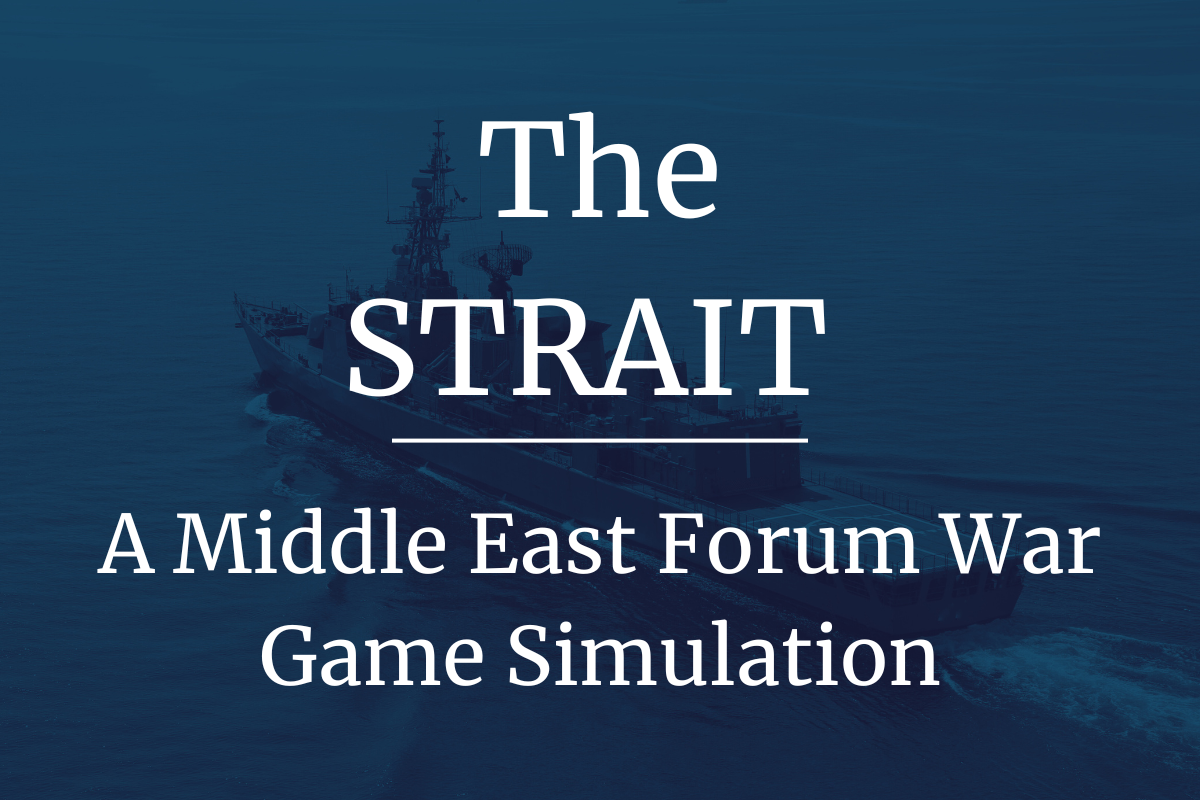| ||
 | ||
| Israel on the Cusp; Sanction Syria; Pakistani Perfidy; Support Israel at Graduation; A Pro-Jihad Felon in the Classroom By Winfield Myers ● May 15, 2025 Smart Brevity® count: 7 mins...1863 words Jonathan Spyer writes that Israel’s new plan to take and hold territory in Gaza is a tacit admission that its previous approach has failed to destroy Hamas rule in Gaza. The new plan intends to achieve that goal—if Israel makes a firm decision to execute it. Lifting sanctions on Syria, argues Michael Rubin, is a bad move that emboldens terrorists and their sponsors. Spyer and Rubin each offer analyses of the India-Pakistan conflict, with Spyer dissecting Pakistan’s use of proxy Islamist groups and Rubin holding that India must—against the inertia of Western diplomats—have Pakistan declared a terror state. A.J. Caschetta describes his demonstration of support for Israel during a commencement ceremony (ingredients: need, thread, and a small Israeli flag)—and he urges others to follow suit. Dexter Van Zile reports an alarming story of an antisemitic, pro-jihadist felon hired by a Staten Island mosque to teach children and calls for state action to address such threats to America’s future. | ||
ICYMI: Israel Insider with Ashley PerryIs there a rift in goals and perceptions regarding the Middle East between the Trump administration and the Israeli government? If so, how is this likely to manifest in the coming days and weeks as President Trump visits the region? Ashley Perry is an advisor to the Middle East Forum’s Israel office. He served as adviser to Israel's minister of foreign affairs and deputy prime minister in 2009-15, and has also worked with Israel's Ministers of Intelligence, Agriculture and Rural Development, Energy, Water and Infrastructure, Defense, Tourism, Internal Security, and Immigrant Absorption and as an advisor to The Negev Forum. Originally from the U.K., he moved to Israel in 2001. He holds a B.A. from University College London and an M.A. from Reichman University (IDC Herzliya). To watch the full podcast episode, click here. | ||
Israel on the Cusp of Finishing the War That Hamas StartedIsrael's security cabinet approved a transition from raids to a territorial takeover in Gaza, aiming to dismantle Hamas rule. Why it matters: This shift acknowledges past strategies haven't achieved the goal of crushing Hamas, despite military successes elsewhere.
The big picture: Israel has faced attacks on multiple fronts but has managed to neutralize threats in Lebanon, Iraq, and Yemen.
What’s next: The operation is poised to start post-Trump’s Middle East visit, with officials hinting at it being a pressure tool in hostage negotiations.
The bottom line: Hamas intends to prove that by striking at Israel’s underbelly—its concern for every one of its citizens—Israel’s enemies can paralyze the Jewish state and prevent a decisive response to aggression.
To read the full article, click here. | ||
Lifting Sanctions on Syria Is Al Qaeda’s Dream Come TruePresident Trump met with Ahmad Al-Sharaa, interim president of Syria and former Al Qaeda leader, raising concerns over diplomatic priorities. Why it matters: Al-Sharaa, once targeted with a $10 million U.S. bounty, now sits at the helm of a fragmented Syria.
Between the lines: Trump's approach mirrors past gambles with North Korea and the Taliban, neither of which worked.
The stakes: Ignoring Al-Sharaa’s past could foster an “Axis of Al Qaeda” from Ankara to Damascus to Doha, which, in turn, could imperil Lebanon’s reconstruction, Jordan’s stability, and Israel’s security.
To read the rest of the article, click here. | ||
How Islamist Militant Groups in Pakistan’s Foreign Policy Affected the Kashmir ConflictIndian forces launched a series of targeted strikes in Pakistan's Punjab and Kashmir after a horrific terror attack in Pahalgam. Why it matters: The Pahalgam massacre, the deadliest in decades, claimed 27 lives and underscores Pakistan's ongoing use of terror proxies like Lashkar a-Taibe to destabilize India.
The stakes: Pakistan's military, embroiled in internal chaos, leverages Islamist proxy groups to distract from its failings and to bolster its standing through conflict.
The bottom line: What is taking place in Pakistan is the harnessing of the energies of political Islam for the advancement of state interests. The international community will now set about trying to mediate de-escalation.
To read the full article, click here. | ||
The STRAIT: A Middle East Forum War Game Simulation - Thursday, May 22While registration for our 2025 policy conference, Statecraft Reimagined, has closed, there is still time to register for THE STRAIT, a one-day war game simulation hosted by the Middle East Forum on May 22, 2025. This immersive event places you in the heart of a hypothetical crisis in theStrait of Hormuz—one of the world’s most strategically vital maritime chokepoints. Why Attend? Realistic Scenario: Confront cyber threats, naval standoffs, and diplomatic showdowns in a setting that reflects modern-day regional tensions.Expert Leadership: MEF staff, backed by a team of regional and security specialists, will guide you through this high-stakes exercise.Hands-On Experience: Hone your crisis management, negotiation, and decision-making skills in real time.Networking: Engage with policymakers, analysts, and thought leaders who share a passion for Middle East affairs and global security. What to Expect: Confidential Briefings: Before the event, you’ll receive exclusive background materials outlining the forces at play—from Iran’s growing asymmetric capabilities to Saudi Arabia’s advanced military power.Interactive War Game: Take on the role of a key actor—whether it’s a regional state, a global superpower, or a critical stakeholder—and decide how to respond as tensions mount.Strategic Outcomes: Thesimulation’s outcome rests on your decisions. Will you negotiate a peaceful settlement, or spark a conflict with global repercussions?Don’t miss your chance to experience THE STRAIT—a compelling and educational event that will challenge your strategic thinking and expose you to the complexities of 21st-century geopolitical crises. We look forward to your participation in this exciting simulation! To register for The STRAIT, click here. | ||
Rawalpindi Goes Hezbollah: India Must Push to Label Pakistan a Terror StatePakistan's latest maneuvers mirror the terrorist playbook perfected by Hamas and Hezbollah: execute terror attacks, escalate tensions, then hide behind diplomatic shields to evade accountability. Why it matters: Hezbollah's past tactics, like those in 1996 and 2006, show how terror groups manipulate international diplomacy to survive.
The stakes: Indian Prime Minister Narendra Modi must avoid Israel's past mistakes and ensure that any ceasefire does not revert to the status quo ante, which would embolden terrorists.
The bottom line: Mere promises from Pakistani Army Chief Asim Munir and Islamabad cannot be trusted; real reform is needed.
To read the full article, click here. | ||
How Academics Can Show Support for Israel at Graduation CeremoniesAs the 2023-2024 academic year concluded, Rochester Institute of Technology (RIT) English professor A.J. Caschetta proudly donned his NYU doctoral robe with an Israeli flag sewn over its badge, a silent protest against rising anti-Israel sentiment in academia. Why it matters: NYU, once a beacon of academic freedom, now ranks among the top anti-Zionist campuses in America, with extensive faculty involvement in boycotts against Israel.
The stakes: Academics across America face a choice: remain silent or stand against the growing anti-Zionist mob.
The bottom line: As universities become hotbeds of anti-Israel activism, it's crucial for faculty to use their academic freedom to champion Israel's right to exist.
To read the full article, click here. | ||
Staten Island Mosque Enlists Felon, Antisemite, and Pro-Jihadist to Teach Children Qur’anThe Muslim Community Center of Staten Island has employed Tarek Mehanna, a prominent extremist who was convicted in 2011 of conspiring to kill his fellow U.S. citizens and sentenced to 17 years in federal prison for his crimes. Why it matters: Mehanna, who during his time in federal prison was allegedly placed in a special unit to prevent him from radicalizing his fellow inmates, now teaches children, despite his unrepentant extremist views exposed online.
The stakes: The U.S. faces a dire threat from inadequately monitored extremists like Mehanna, whose prison time did nothing to curb his radical impulses.
The bottom line: America must urgently legislate robust monitoring systems for released terrorists, akin to sex offender registries, to safeguard society.
To read the full article, click here. | ||
| Thank you for your support and for subscribing to the Dispatch. If you enjoyed it, please forward it to a friend, and please let us know what you thought of this issue. You’ll hear from us again soon. Sincerely, Winfield Myers | ||
| Was this edition useful? Your email will be recorded and shared with the sender | ||
| Powered by | ||
| ||










